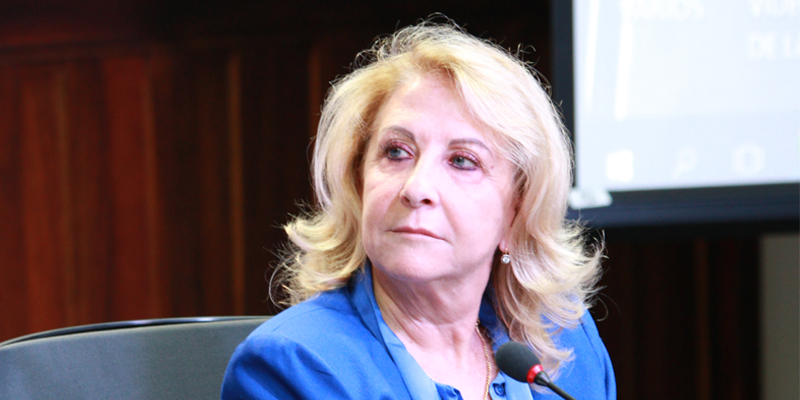Susana Balbo, Chair of W20, a G20 engagement group, made this statement during her visit to IICA Headquarters in Costa Rica, where she participated in the Institute’s commemoration of the International Day of Rural Women.

San Jose, 18 October 2018 (IICA). “It is crucial to incorporate women, who represent 50% of the world’s population, into the work force in order to drive development in countries. Studies by the UN have shown that the inclusion of women who do not currently form part of the labor force could increase the gross national product of G20 member countries by up to 26%, enabling hundreds of millions of women to overcome poverty in emerging countries such as India, China, Saudi Arabia, Brazil, Argentina, Mexico and, indirectly, all of Latin America.”
This was one of the statements made by Argentinian entrepreneur Susana Balbo, Chair of W20, a G20 engagement group. A former deputy, Balbo is a voice of authority in matters related to gender equity and the ideal conditions that must be afforded to rural women in order to empower them and increase their visibility within society.
Balbo visited Costa Rica for the first time in order to participate in an event organized by the Inter-American Institute for Cooperation on Agriculture (IICA) to commemorate the International Day of Rural Women. During the event, she reviewed some of the pending challenges associated with this key issue for development and social inclusion.
“Sustainable development cannot be achieved by 2030 unless women, in both urban and rural areas, are standing and rendered fully visible; all women who are invisible to the system must exist in order to achieve a more equitable and sustainable world,” explained Balbo.
Balbo, Argentina’s first female oenologist, noted that access to education, credit opportunities and financial services to achieve financial independence, as well as digital inclusion to facilitate access to technologies and markets, are critical to improving rural women’s quality of life and providing them with a more promising future.
“One way in which women can accelerate change and improve their lives is through access to a better education as well as digital inclusion, which provides them with financial independence. Although we face different needs, this is a reality in all G20 member countries,” added the businesswoman, who has more than 30 years of experience in the wine industry.
Public policies with a different lens
Despite the fact that rural women represent 43% of the agricultural work force and account for 50% of global food production, most countries still lack differentiated public policies for this segment of the population. The countries that do possess differentiated policies, fail to apply or comply with these policies due to a lack of interest.
“There are many robust public policies related to women; however, they are not taken into account, respected or applied, likely due to ignorance or lack of interest. For instance, the development of a modern global agenda will require determination and willpower on the part of political leaders, who must commit to this agenda and make it a reality in their countries,” stated Balbo.
According to the Chair of W20, it is important to “apply a ‘gender lens’” when drafting and implementing policies for the benefit of this sector of the population, to ensure that they are tailored to women’s real needs. She acknowledged the fact that, throughout this process, it is critical to provide women with the right to speak and vote in various dialogue and decision-making platforms, and to listen to their urgent needs.
“We must gather women together so that they can tell us what their needs are. Our experience at the W20 meeting was that the women in attendance primarily requested infrastructure, access to drinking water, energy, Internet, and other very basic needs. We will not gain anything from the public policies that have been established unless these policies are respected and applied. Women’s voices must be heard, and we must enable women to participate in decision-making forums where they can express what they require to achieve adequate development,” she noted.
The influential entrepreneur from the province of Mendoza, in Argentina, mentioned that, in the case of W20, it was occasionally difficult to put all G20 members on the same wavelength or to convince them regarding matters related to gender equity and rural women, due to the diversity of countries.
“In some countries, women have either very few or no rights, while in other very developed countries, women have full access to all rights; this diversity slows down progress. The disparities between countries begin to play a role whenever leaders must develop communiqués and adopt policies through consensus. This makes it difficult to achieve concrete proposals and actions regarding different matters such as land ownership and inheritance rights, due to the variety of cultural, religious and legal viewpoints,” stated Balbo.
Susana Balbo concluded her remarks by encouraging everyone to “honor rural women every day of the year, not only on their international day, so that we may always remember them and realize that they are the ones who have provided us with food and enabled us to preserve our culture and traditions. Although their voices have been rendered almost imperceptible by the system, they protect our families and heritage, and care for nature with endless love.”
Summary of the interview with the W20 president (Spanish only):
Susana Balbo, International Day of Rural Women.
More information:
Institutional Communication Division of IICA











